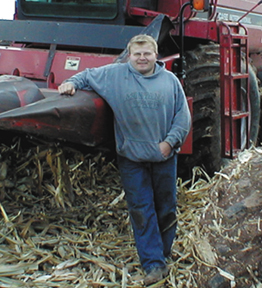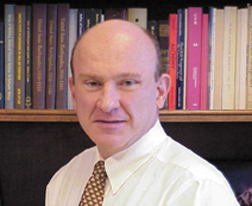
Geotimes Home | AGI Home | Information Services | Geoscience Education | Public Policy | Programs | Publications | Careers

 American Geological
Institute (AGI) fellow Larry Kennedy is a staffer for his home-state senator
Harry Reid (D-Nev.). Kennedy comes to the legislative branch with 20 years of
experience working as a mineral explorer for the mining industry. While he has
traveled across North and Central America for his job, meeting fascinating people
and seeing fantastic geology, Kennedy never saw any of his projects come to fruition.
“The science was sound, but there is a lot of opposition locally and nationally
to mines getting built.” The main reason for that he says is the legacy of
the pre-1970 mining industry. Modern technology has improved mining methods, Kennedy
says, and he suspects much of the mining industry’s past is what influences
public policy decisions today. “The demands that we as a society make on
resource development are immense, but how do we balance the need forresources,
including managing water resources, with our need to conserve and protect our
natural landscape and restoration projects?” Kennedy hopes that the variety
of issues he will face as a fellow in Reid’s office will help him answer
that question.
American Geological
Institute (AGI) fellow Larry Kennedy is a staffer for his home-state senator
Harry Reid (D-Nev.). Kennedy comes to the legislative branch with 20 years of
experience working as a mineral explorer for the mining industry. While he has
traveled across North and Central America for his job, meeting fascinating people
and seeing fantastic geology, Kennedy never saw any of his projects come to fruition.
“The science was sound, but there is a lot of opposition locally and nationally
to mines getting built.” The main reason for that he says is the legacy of
the pre-1970 mining industry. Modern technology has improved mining methods, Kennedy
says, and he suspects much of the mining industry’s past is what influences
public policy decisions today. “The demands that we as a society make on
resource development are immense, but how do we balance the need forresources,
including managing water resources, with our need to conserve and protect our
natural landscape and restoration projects?” Kennedy hopes that the variety
of issues he will face as a fellow in Reid’s office will help him answer
that question.  Raphael “Rafe”
Sagarin acquired a taste for politics after interning for the Wilderness Society
in Washington, but he wanted a better understanding of the issues for which he
was lobbying. He went back to school and earned a doctorate in marine ecology
at the University of California at Santa Barbara. At 31, Sagarin is again in the
political arena, this time as a Geological Society of America/U.S. Geological
Survey fellow working for Rep. Hilda Solis (D-Calif.). He summarizes the different
attitudes he’s experienced, explaining that lobbyists “convince others
that you’re right no matter what, rather than asking [as scientists do]:
Am I right and what are the potential holes in my argument?” To find balance,
Sagarin says he hopes to advise his boss of the best actions to take based on
the best science available.
Raphael “Rafe”
Sagarin acquired a taste for politics after interning for the Wilderness Society
in Washington, but he wanted a better understanding of the issues for which he
was lobbying. He went back to school and earned a doctorate in marine ecology
at the University of California at Santa Barbara. At 31, Sagarin is again in the
political arena, this time as a Geological Society of America/U.S. Geological
Survey fellow working for Rep. Hilda Solis (D-Calif.). He summarizes the different
attitudes he’s experienced, explaining that lobbyists “convince others
that you’re right no matter what, rather than asking [as scientists do]:
Am I right and what are the potential holes in my argument?” To find balance,
Sagarin says he hopes to advise his boss of the best actions to take based on
the best science available.  The American
Geological Institute presented its most prestigious award, the Ian Campbell
Medal, to geologist Frank H.T. Rhodes on Oct. 28, during an award ceremony in
Denver. Rhodes is president emeritus of Cornell University, and a world-renowned
geoscientist and advocate for education and research.
The American
Geological Institute presented its most prestigious award, the Ian Campbell
Medal, to geologist Frank H.T. Rhodes on Oct. 28, during an award ceremony in
Denver. Rhodes is president emeritus of Cornell University, and a world-renowned
geoscientist and advocate for education and research.  Teachers are not the
only ones concerned about what to teach, Ridky says. “Even in the sub-disciplines
such as mineralogy or geomorphology, you put a group of scientists together and
I bet they would have a bear of a time listing the fundamental understandings
that are important, to say nothing of the style and the means of transferring
that information.”
Teachers are not the
only ones concerned about what to teach, Ridky says. “Even in the sub-disciplines
such as mineralogy or geomorphology, you put a group of scientists together and
I bet they would have a bear of a time listing the fundamental understandings
that are important, to say nothing of the style and the means of transferring
that information.”
 |
Geotimes Home | AGI Home | Information Services | Geoscience Education | Public Policy | Programs | Publications | Careers |